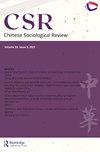Timing and pathways: differences in marriage behavior among migrants and local Shanghainese born in 1980–1989
IF 1.4
2区 社会学
Q2 SOCIOLOGY
引用次数: 1
Abstract
Abstract The disparity in marriage timing between migrants and non-migrants in China has been detected. One of the explanations for this inequality is the hukou status. Yet, this explanation neglects a special type of migrants: those who have earned a local hukou. This study specifies non-hukou migrants, hukou converters, and local residents in Shanghai, and compares their marriage timing and pathways. Using discrete-time event analyses, this study finds that both non-hukou migrants and new Shanghainese (hukou migrants) are more likely to have a delayed marriage than their local counterparts, showing that hukou preference is not the sole explanation for marital inequality in China. Further estimations reveal that new Shanghainese spend a longer time entering a network-introduced marriage while they exhibit no difference in the timing of self-initiated marriages than local Shanghainese. The results indicate that hukou migrants are not deprioritizing marriage, but they lack social connections to the local marriage market. Non-hukou migrants encounter double disadvantages of lacking a local hukou and local social connections. Social networks are an alternative lens other than the hukou status to understanding marital disparities among migrants and non-migrants in China.时间与途径:1980-1989年出生的外来人口与上海本地人的婚姻行为差异
摘要中国移民和非移民在结婚时间上的差异已经被发现。造成这种不平等的原因之一是户口状况。然而,这种解释忽略了一种特殊类型的移民:那些拥有当地户口的人。本研究以非户口移民、户口转换者和上海本地居民为对象,比较了他们的结婚时间和途径。通过离散时间事件分析,本研究发现,非户口移民和新上海人(户口移民)都比当地人更有可能延迟结婚,这表明户口偏好并不是中国婚姻不平等的唯一解释。进一步的估计表明,新上海人进入网络婚姻的时间更长,而他们与本地上海人相比,在自主婚姻的时间上没有表现出差异。研究结果表明,户口移民并没有贬低婚姻,但他们与当地婚姻市场缺乏社会联系。非户口移民面临着缺乏当地户口和当地社会关系的双重劣势。除了户口身份之外,社交网络是了解中国移民和非移民婚姻差异的另一个视角。
本文章由计算机程序翻译,如有差异,请以英文原文为准。
求助全文
约1分钟内获得全文
求助全文

 求助内容:
求助内容: 应助结果提醒方式:
应助结果提醒方式:


